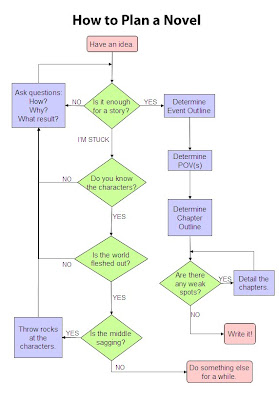You guys asked some really good and difficult questions. Hopefully this is as much fun for you as it is for me. If not, well, that's too bad, because I'll probably do it again.
Ben asked:
What is your least favorite book?Of books I've read to the end, my least favorite is probably
Tribulation Force from my least favorite series,
Left Behind. It wasn't the theology that bothered me (I was actually interested in a 'what-if' of rapture theology). What bothered me was the dozens of major characters all alike, the paper cut-out villains, the huge apocalyptic moments handled in a single paragraph.
So why this book rather than one of the other 16? The title edged it out. Tribulation Force is just... not a cool name.
Ben:
What is the worst thing you would do to get published with your favorite editor?I would crush my enemies, see them driven before me, and hear the lamentations of their women.
Was that your question?
Ben:
What is your favorite quality of your writing or yourself as a writer?When I'm outlining and drafting, I love everything. When I'm getting critiques and rejections, I hate it all. I will say this: whatever anyone else thinks, I love writing air pirate dialog. It's just fun, aye?
Of course even my most critical betas said they enjoyed the way air pirates talk, so I might have just decided, after the fact, that I like it too.
Anne L. B. asked:
Why do you write (other than you can't not)?I've always loved to create stories - kindergarten make-believe, Star Wars action figures with my brothers, writing Choose-Your-Own Adventures, designing video games, GMing D&D sessions...
About 6 years ago I decided my time was too limited to do everything I wanted. I chose to focus on writing because - between making novels, board games, computer games, or movies - I thought a novel was something I could most likely complete with the skills/resources I had.
Of corollary interest, around the same time I wrote a prototype game based on the
Air Pirates world. It just shows how long I've been thinking about it, I guess:
 Natalie
Natalie said:
I've always admired what you do in Thailand. What made you want to go there and work with kids?The short answer: God called us.
A longer answer: Cindy (who is Thai-American) wanted to run an orphanage since highschool. When I first told her I liked her, the third thing she said to me was, "If God calls me to be a missionary overseas, what will you do?" (Yeah, we were thinking long term from the start). That got missions in my head.
Years later we finally decided to "become missionaries." My original thought was to plant a church or something, but one thing after another kept putting Fatherhood on my heart. When we moved here, and started volunteering at a children's home while we learned the language, I realized being a father was all I wanted to do. It's what I was made for.
Natalie:
What's your favorite Final Fantasy? Least favorite?I've only played the big ones a little bit (meaning VII thru XI). Of the ones I have played,
Crystal Chronicles is my favorite. You can't beat multiplayer RPGs, I think. Four guys on a couch in a boss fight, yelling at each other so we can get the combos timed just right... Yeah. Good times.

My least favorite was probably
Final Fantasy I, not because it wasn't good, but because I recall many hours of fighting
Frost Gators just to level up. On the other hand, FFI introduced me to airships.
Hilary asked:
After reading the first page of my manuscript, would you want to keep reading?Yes, largely due to the stranger (yay, tension!) and because I want an explanation for the last paragraph. I left more comments in your comments.
Hilary:
When/where are you most inspired to write?For some reason, the ocean tugs something inside me; when I see it I want to write, to create worlds. Mountains and other landscapes do it too, but nothing quite as strong as the ocean. I don't know why. It sucks that I live like 20x farther from the ocean than I've ever lived in my life.
Excellent stories also make me want to write excellent stories. Miyazaki, Cowboy Bebop, Firefly, and Naruto inspire pretty consistently (yes, most of that is anime). Though occasionally something really excellent, like say
Dark Knight, just makes me think, "Man, I'll never be able to write like
that."
 Movies -- Star Wars IV-VI, The Matrix, Serenity, The Incredibles, Pirates of the Caribbean... Give me action, fantasy, sci-fi. Give me a Chosen One, someone coming into his own, someone with special powers. Love interest? If you must. But don't overshadow the rebellion/rescue/vengeance with unnecessary kissing.
Movies -- Star Wars IV-VI, The Matrix, Serenity, The Incredibles, Pirates of the Caribbean... Give me action, fantasy, sci-fi. Give me a Chosen One, someone coming into his own, someone with special powers. Love interest? If you must. But don't overshadow the rebellion/rescue/vengeance with unnecessary kissing. Board Games -- I'm talking about real strategy games. Settlers, Ticket to Ride, Puerto Rico, Alhambra, Carcassonne... I think it's my German blood.
Board Games -- I'm talking about real strategy games. Settlers, Ticket to Ride, Puerto Rico, Alhambra, Carcassonne... I think it's my German blood.My Kids -- I have awesome kids, guys. Right now we've got 4. There's the boys, Isaac and Nathan, both 2, who make me laugh everyday; if you follow me on Twitter or Facebook, you probably know that. There's Lutiya (10), willing to learn any game I'll teach her, even though she's just learning English. And Pan (17), who is the most respectful, helpful teenager I've ever met; I just wish I could take credit for it.


















